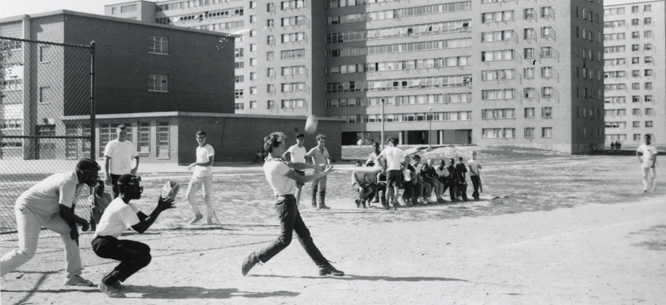The Case for Public Housing
What is to be done? Take land off the speculative market, build housing on it, and keep it permanently affordable for anyone who might want to live there. This is being done or attempted in many cities by the community land trust movement, which puts forward a vision of community-controlled affordable housing. I wholeheartedly support that vision. I also imagine a future in which the government, instead of capitulating to the demands of real estate developers, assumes the responsibility of providing shelter itself.
Karen Narefsky ▪ November 20, 2015
When people on the left think about solutions to the housing crisis, few of us think about public housing. Faced with the twin problems of overinvestment, leading to gentrification and displacement, and underinvestment, leading to substandard housing and foreclosures, we tend to think about locally based solutions, which makes sense. Many of these problems are caused by the state in collusion with the real estate industry, and it seems impossible to imagine a future in which the government plays a different role. But I’d like to imagine a future in which many of us live in, and thrive in, public housing.
Any discussion of the future of public housing must begin by understanding its origins. Public housing in the United States first emerged in the 1930s as part of the New Deal, when there was an enormous shortage of housing following the Great Depression. The federal government began by making loans to nonprofit corporations to build housing. This program produced very few housing units, due both to the lack of qualified builders and to the inefficiency of channeling public funds through the limited-dividend corporations. As a result, under the Public Works Administration, led by Secretary of the Interior Harold Ickes, the government decided to enter the housing business: rather than paying companies to build government-subsidized housing, the state would build and maintain housing through local housing authorities.
< snip >
In its relatively short history, public housing has suffered from rampant corruption in some cities, and from the failure of many local housing authorities to maintain and repair housing projects. But this doesn’t mean public housing is a flawed concept, just as “underperforming” public schools whose students are burdened by poverty don’t serve as proof that public education is a failed endeavor. Public disinvestment is the first step in a now-familiar playbook that leads to privatization ...
More here:
https://www.dissentmagazine.org/online_articles/case-for-public-housing-vienna-chicago

